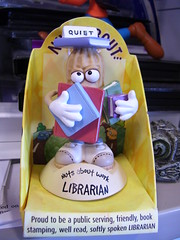My colleague gave me a nifty pin to wear announcing that King County has a new program series called Playing with Words. Branch libraries can book individual programs on "[m]usic, poetry, rhymes and stories ... coming to a library near you!"
I'm whimsical in my connections myself--once in an alphabetical list of library gardening resources, I included Dewey numbers for "Knees, hygiene and health," and "hot tubs," for example. But in as much as I was thinking of playing with words just this morning (what a coincidence, but more on that later), I have to admit I didn't see an immediate connection between
American Spirit
Presented by Gerald Fierst
Ages 5 and older
What would the oldest man in America be able to tell you about our Founding Fathers (and Mothers)? This renowned storyteller recreates some of the characters who helped shape our country and shares some hilarious folktales, too.
Bellevue Regional Library, Monday, May 7, 7pm
Federal Way Regional Library, Wednesday, May 9, 7pm
and playing with words. I suppose, for the sake of argument, words had a big influence on how our country was shaped. Nevertheless, the kind of play with words I think of is more in line with the other programs. If this group of Spring programs was a mystery, American Spirit would be the red herring clue--or else the red herring clue that is really the important clue after all.
Now, about playing with words from this corner of my mind. I was thinking about how "one" goes to "once," "two," goes to "twice," and "three" goes to "thrice" (although admittedly, is not often used). What about four or five? I know English doesn't really follow consistent patterns--that it seems to start a pattern of one kind or another and then break out--"-ed" past tense and irregular verbs, for example. But that doesn't stop me from trying to think "what would follow next" in the pattern.
The pattern seems to be take the beginning of the number--on-, tw-, thr- and combine it with -[i]ce. Soooooooooooooo fource? fivice?
As amusing as I find all this, it usually isn't very long before I have to rain on the fun and look up the words in question to see what's really going on, and why the pattern stops. ("oh, that's an 'irregular' verb" [in the case of irregular verbs, time and less use by speakers of the language seem to be the verb laxitive, making verbs regular].)
Anyway, the Oxford American Dictionary, 2nd e, says in the case of once, twice and thrice their etymology comes from Middle English, ones; Old English, twiges; and Middle English, thries (from old English thriga). The -es was changed -ce to "retain the unvoiced sound of the final consonant." So, Old English four is feower. Old English five is fif. In the stream of time, I guess single words for "four times" or "five times" either disappeared or didn't come into existence because they weren't used as often.
Well. That certainly killed that play date...
Oops.
I'm whimsical in my connections myself--once in an alphabetical list of library gardening resources, I included Dewey numbers for "Knees, hygiene and health," and "hot tubs," for example. But in as much as I was thinking of playing with words just this morning (what a coincidence, but more on that later), I have to admit I didn't see an immediate connection between
American Spirit
Presented by Gerald Fierst
Ages 5 and older
What would the oldest man in America be able to tell you about our Founding Fathers (and Mothers)? This renowned storyteller recreates some of the characters who helped shape our country and shares some hilarious folktales, too.
Bellevue Regional Library, Monday, May 7, 7pm
Federal Way Regional Library, Wednesday, May 9, 7pm
and playing with words. I suppose, for the sake of argument, words had a big influence on how our country was shaped. Nevertheless, the kind of play with words I think of is more in line with the other programs. If this group of Spring programs was a mystery, American Spirit would be the red herring clue--or else the red herring clue that is really the important clue after all.
Now, about playing with words from this corner of my mind. I was thinking about how "one" goes to "once," "two," goes to "twice," and "three" goes to "thrice" (although admittedly, is not often used). What about four or five? I know English doesn't really follow consistent patterns--that it seems to start a pattern of one kind or another and then break out--"-ed" past tense and irregular verbs, for example. But that doesn't stop me from trying to think "what would follow next" in the pattern.
The pattern seems to be take the beginning of the number--on-, tw-, thr- and combine it with -[i]ce. Soooooooooooooo fource? fivice?
As amusing as I find all this, it usually isn't very long before I have to rain on the fun and look up the words in question to see what's really going on, and why the pattern stops. ("oh, that's an 'irregular' verb" [in the case of irregular verbs, time and less use by speakers of the language seem to be the verb laxitive, making verbs regular].)
Anyway, the Oxford American Dictionary, 2nd e, says in the case of once, twice and thrice their etymology comes from Middle English, ones; Old English, twiges; and Middle English, thries (from old English thriga). The -es was changed -ce to "retain the unvoiced sound of the final consonant." So, Old English four is feower. Old English five is fif. In the stream of time, I guess single words for "four times" or "five times" either disappeared or didn't come into existence because they weren't used as often.
Well. That certainly killed that play date...
Oops.
(Inner critic: this doesn't even rise to the level of pretension; it's merely pedantic. But yeah, I think like that.)














No comments:
Post a Comment